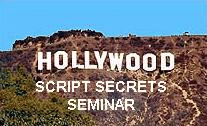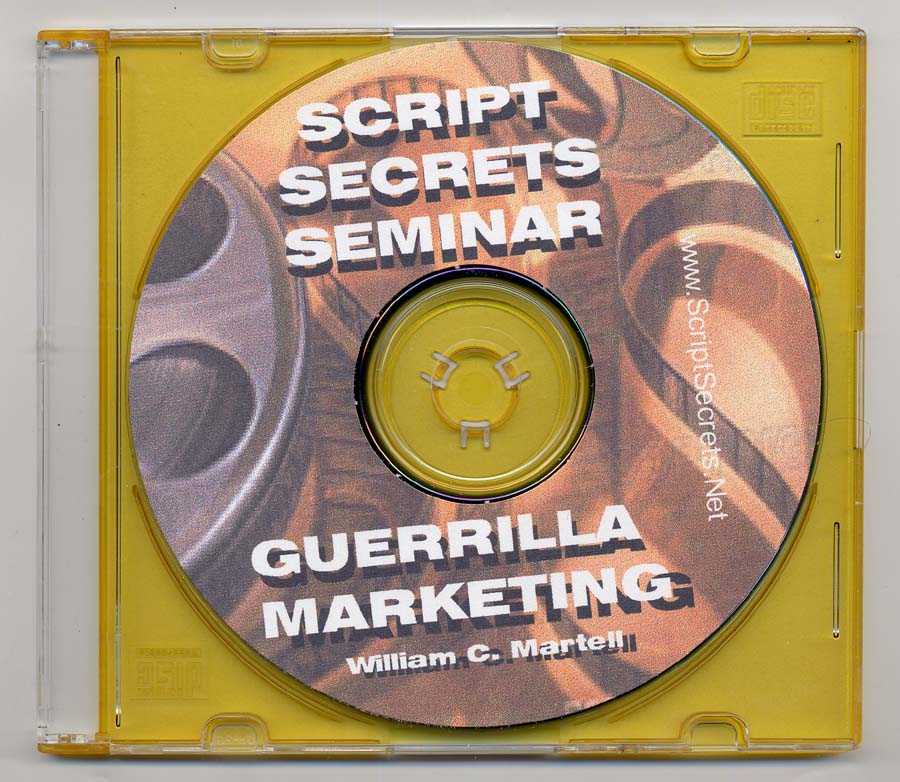

SCRIPT SECRETS SEMINAR *
INCREDIBLE CONFLICT: CLASS SCHEDULE
* Formerly Naked Screenwriting
Refocused for 2007! SCRIPT SECRETS: INCREDIBLE CONFLICT - Conflict is what exposes and explores character. The most interesting character in the world shown sitting on his Lazy-Boy eating Cheetos and watching the news will seem bland. Conflict - deep emotional conflict - is what brings that character to the surface. How do we find the right conflict for the character? How do we use conflict to create compelling and emotional stories? We'll be using THE INCREDIBLES as our primary example, with clips from that film as well as THE MATRIX, AIRPLANE, THE BIG SLEEP and DILLINGER. DAY 1, 9am - 6pm - FOUNDATIONS
Story is conflict. Without conflict your characters will not be tested, they will never have to face thier fears or deal with deep emotional issues. We will start out looking at the different kinds of conflict, then use those conflicts to explore character and theme ... and find a high concept idea that helps us explore a character's *emotional* conflict. Then we'll look at structuring conflict and pacing and the toughest part of any screenplay: the dreaded Act 2! Examples will include THE INCREDIBLES, LIAR LIAR, BREAKING AWAY, and MEMENTO.
INTRO: What is a story? - Why we need conflict to tell a story.
1) Central Conflict - Film stories use two kinds of conflict: Emotional Conflict (character) and Physical Conflict (action). These two work together to explore character... and they are *connected*. 3 different types of physical conflicts. Finding the best emotional conflicts. Avoilding "conflict condoms" and other mistakes that drain the life and emotions from your story.
2) Character In Conflict - The 3 best techniques to make your protagonists three-dimensional.Emotional and physical conflict - why you need both! Why *you* are your protagonist.
3) Bringing Your Protagonist To Life - 12 ways to make your lead character likeable. 20 character building techniques for protagonists. How your character's job, props, clothes, friends, home, traits, slang and car can give the audience important information and make your characters spring to life.
4) Conflict And Ideas - How conflict and concept are connected. Where do you get your ideas? 15 fresh places to find great script ideas. Brainstorming - Methods for creatiung original ideas from nothing. Finding the RIGHT idea for your script. High Concept is MY concept - a story you are passionate about that producers will be passionate about.
5) Conflict And Story - Internal and external conflicts and story. The 10 critical elements of any story. Growing story from character... or character from story. How story works. The connection between story and character.
6) Conflict In Theme - Using conflict to explore theme. Why theme is the most important element in a screenplay. Your personal themes and your voice as a writer - how to identify and develop them. Theme and nexus. Theme and dialogue.
7) Structure & Pacing - How the traditional 3 Act structure REALLY works - why it's been used for over 2,400 years. 5 techniques to improve pacing... and why pacing is critical to every screenplay. "Genre juice" and pacing. Keeping that conflict coming!
8) Act 2 Booster - Dozens of techniques to help you through Act Two. From creating momentum to denial to dilemma to levels of conflict to pacing to the escalator of doom. The biggest problem with most scripts (and most Act 2s) - not enough conflict! How to make Act Two not only easy to write... but fun!
DAY 2, 9am - 6pm - ADVANCED TECHNIQUES
Now that we have our central conflict, characters, and story... it's time to put them to work! Proven techniques use by professional writers to make their scripts *great*! You'll learn how to heighten drama by using contrast. How to use slang, jargon, subtext, banter and non-verbal dialog. Demonstration, symbolism, leitmotifs, and other ways to tell stories with pictures. How to pitch your script - the difference between agents and managers. Finding the right producer for your screenplay. Examples will include THE INCREDIBLES, LIAR LIAR, REAR WINDOW, and BREAKING AWAY.
1) Thinking In Pictures - Film is a visual medium, and we use conflict to *show* character through actions. Visual characterization and visual story telling - 12 tools you can use today!
2) Your First Ten Pages - Should you open your script with action? Hooks, lures, kickers, string theory. Six basic ways to start your screenplay - the opening scene. The 12 critical elements of your first ten pages - do you have them all?
3) Conflict And Your Supporting Cast - How each character in your supporting cast helps explore the central conflict. Over 10 character building techniques for supporting characters - how to make them individual and memorable. Vivid supporting characters and the subplot prism.
4) Advanced Dialogue - 5 ways to create original dialogue... by making up your own words! Conflict in dialogue. Over 20 techniques to make your dialogue sing. 5 ways to remove OTN (on the nose) dialogue.
5) Conflict And Scenes - Ten ways to create new scenes. Using conflict situations to expose character. Using story and character DNA in scene creation. How long should a scene be and how many should I have in my script? Match cuts and ways to connect scenes. 7 things all scenes *need* to work.
6) Emotion Pictures - A good script emotionally involves the reader. How to involve the audience by using reversals, suspense, and plot twists. How to create audience participation through choices and reaction to conflict.
7) Creating Satisfying Endings - How the final conflict explores character. 14 types of endings for your screenplay - which is best for YOUR script? 5 critical elements that ALL screenplay endings need.
8) Marketing Your Screenplay - How to pitch your script. 25 methods to build your career... things you can do TODAY! What does Hollywood want? Writing scripts that sell. How to sell even without an agent or manager.
FADE OUT: How YOU can write movies that actually get made!
SCHEDULE REGISTER PAYMENT METHODS GETTING THERE STUDENT FEEDBACK WHO SHOULD ATTEND INSTRUCTOR
I got more from your class than any other.
- R. SharpVery practical information presented in an easygoing, approachable manner. With his no-nonsense presentation and nuts-and-bolts approach, Bill Martell demystifies the often obfuscated process of screenwriting. Using concrete examples from classic movies and recent blockbusters, Bill takes the "woo-woo" out of the art of writing for film and replaces it with solid craft.
- K. SandlerWant a brochure and registration form? E-mail me your postal address: Send Me A Registration Form!
Show Me The Monkey! The new Script Secrets *Typing Monkey* logo is here! He's busy working on PLANET OF THE APES 2... but you can have him *now* on a coffee cup or sweat shirt or messenger bag! I drink my morning coffee from a Script Secrets Monkey mug. Would you like a Script Secrets Typing Monkey mug of your own? The Script Secrets Store is OPEN!
What screenwriters do you absolutely hate? What films are over-rated? Is DECK THE HALLS one of the signs that the world is about to end? Be heard: Movie Discussion!
My friend Jeff Burr's new movie is SAVING PRIVATE RYAN meets FREAKS!

CLASSES ON CD! Five Classes are ready to ship on audio CD: GUERRILLA MARKETING YOUR SCRIPT: NO AGENT? NO PROBLEM!, WRITING HORROR, WRITING THRILLERS (2 CD set), WRITING INDIES and IDEAS & CREATIVITY. Classes on CD - Click Here!
IDEAS AND CREATIVITY - 80 minute CD packed with information. Tools to find ideas that are both personal *and* commercial. How to turn your personal story into a blockbuster - or find your personal story in a high concept idea. Brainstorming and being creative. Ideas and Creativity is $14.95 (plus $3 S&H)
WRITING INDIES - Writing an Indie film? This class covers everything you need to know - from Central Locations to Confined Cameos. Using examples from SWINGERS, THE COOLER, STATION AGENT and others, this 80 minute CD is packed with information. How Indoe films challenge the audience (while mainstream films reassure the audience). Structures, using BOYS DON'T CRY, RUN LOLA RUN, HILARY & JACKIE, and others as example. Writing for a budget, writing for non-actors, getting the most production value out of your budget. Writing Indies is $14.95 (plus $3 S&H)
WRITING THRILLERS - a TWO CD Class - The first CD covers the essentials of a thriller screenplay, using examples from MINORITY REPORT, NORTH BY NORTHWEST, BOURNE IDENTITY, BREAKDOWN, THE LADY VANISHES, THE GAME and THREE DAYS OF THE CONDOR as primary examples - what do all of those films have in common? This CD will tell you! Part Two covers the 20 iconic scenes in Thriller films, and explains how suspense works using MINORITY REPORT as an example and how plot twists work using BOURNE SUPREMACY and other films. Writing Thrillers: Two CD Class - $24.95 (plus $5 S&H)
Coming in 2007: The NAKED SCREENWRITING CLASS! The 2001 London Class on 8 CDs! Recorded *live* the morning after the Raindance Film wrapped. Over ten of the sixteen hours of class, plus a workbook, plus some sort of bonus CD... all for one reasonable price!
Click here for more information on CLASS CDs!
To discuss this Script Tip or ask a question, check out the Message Boards - and the FINAL DESTINATION 4 game in the game section!
Return To Menu
Blue Books Script Library Links Book Store Lectures Message Boards Bill's Corner
copyright 2007 by William C. Martell
